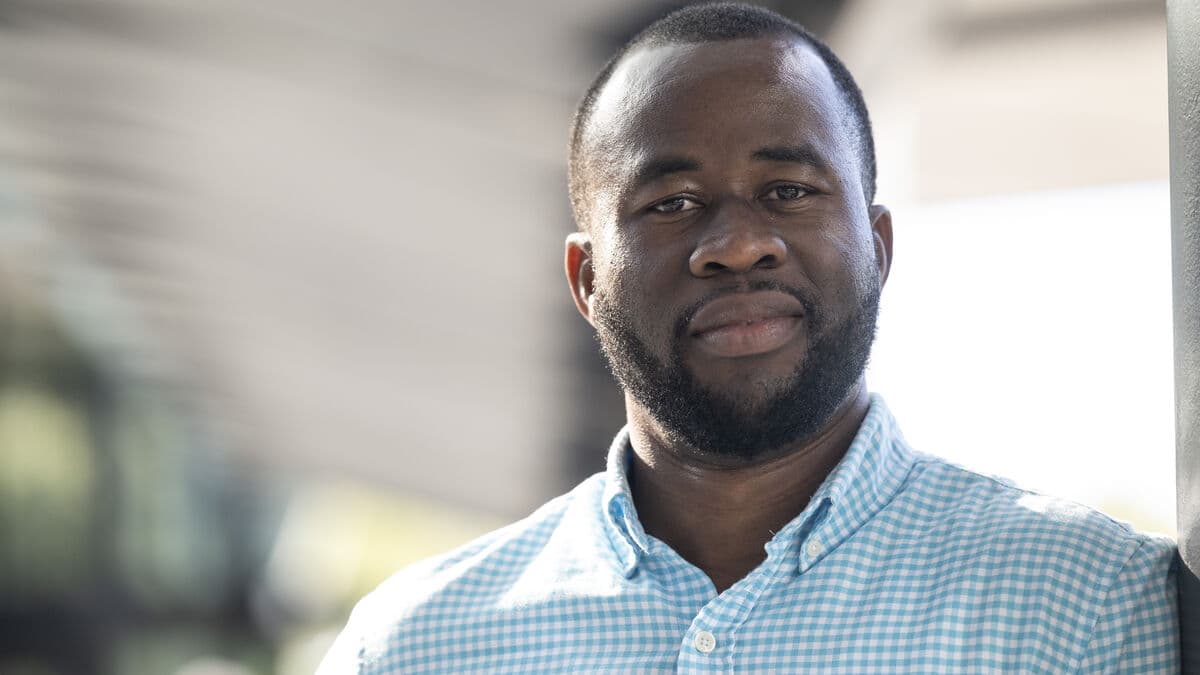Throughout his entire life, Chigozie Obioma has wanted to write about the civil war that tore Nigeria apart in the 1960s, ever since he, as a seven-year-old, visited the eastern parts of his home country and saw how people were maimed by the fighting. But since he had not written historical fiction before, he was nervous.
It's also about an event that is very sensitive in the Nigerian political landscape, he says.
In "The Minorities' Orchestra" the narrator was a guardian angel and in the current "The Road to the New Country" a seer gives voice to both the living and the dead.
My mother said that "the Igbo people believe that the story of war should not only be told by the living, because the nature of war is to create mass death". If only the living tell the story, how will it be complete then?
Conflicts in focus
At the center is Kunle, a shy student who is drawn into the war against his will, on the Igbo side. The Igbo people emphasized equality, Obioma points out, and wanted to create the state of Biafra instead of being part of the British colonizers' Nigeria.
In several colonial constructions in the south, the nation-state was formed backwards. Nigeria was created and then we were forced to become Nigerians. People wondered: what is a Nigerian? An Igbo and Christian or someone who speaks Hausa and is Muslim?
The books Obioma has read about the Biafran War mainly depict the civilians. He wanted to focus on the battles – and shows how Kunle is thrown between battles with a feeling of meaninglessness.
I thought, what did the war itself look like? Who will write "All Quiet on the Western Front" about the Biafran War?
Tribal mentality
The story explores the boundary of free will and the universal in being drawn into something one did not ask for.
Is it not like that for all of us, no one asked to be born? You just get born into a situation – where it is extremely poor, for example.
But the war also makes Kunle less selfish, paradoxically, and deters from new conflicts. The ethnic groups have no problem socializing now, according to Obioma.
On the other hand, he thinks that tribal thinking is strong in the USA, where he lives.
They are so tribally minded in their political affiliation that ethnic division pales in comparison. You can't even have coffee with someone from the political opposition, he says, adding that it leads to a struggle to dominate the other.
It's the politics of subjugation. And it brings out people's most extreme sides.
Elin Swedenmark/TT
Fact: Chigozie Obioma
TT
Born: 1986
Lives: Lincoln, Nebraska, USA.
Family: Wife and two children, five and seven years old.
Background: Teaches literature and creative writing at the University of Nebraska-Lincoln. Praised by critics worldwide for his debut "The Fishermen" which was nominated for the Booker Prize in 2015. His "The Minorities' Orchestra" (2019) was also nominated for the Booker Prize.
Current with: "The Road to the New Country".
Reading now: "I want to read Lina Wolff's 'The Time of the Flesh' and 'The Safekeep' by Yael van der Wouden who was nominated for the Booker Prize last year. And I've also taken on the Bible, it's very fascinating to read the Old Testament. I've read parts of the Bible before, but this helps me understand what's going on in the Middle East, with the idea of "the land" as a holy place.
... to do dirty work:
I've always joked that I do the dirty work of African literature, what no one wants to do. Maybe it's madness or courage, but I think there are gaps in our modern canon, from 1954 and "Things Fall Apart" by Chinua Achebe. I wrote "The Minorities' Orchestra" because I read Dante's "Inferno" and Milton's "Paradise Lost" which explore the cosmology of the Christian faith. We have a whole cosmology in Africa – why doesn't anyone write such a book here? I took the most prominent aspects of Igbo mythology and wrote about it, epically.






